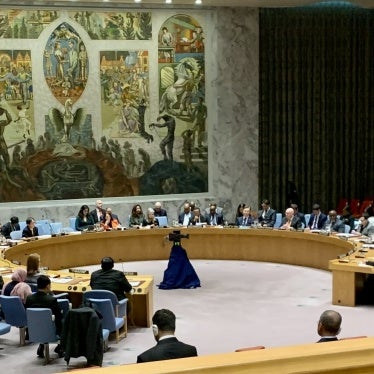Human Rights Watch welcomes the adoption of the outcome ofthe UPR of Afghanistan, which reflects many important recommendations to address human rights concerns in the country.
In particular, in line with many accepted UPR recommendations, we appreciate the steps Afghanistan has taken to address violence against women, particularly through adoption of the Elimination of Violence Against Women (EVAW) Law and the establishment of provincial commissions on the elimination of violence against women. However, significant gaps in the implementation of this law remain, meaning that few cases of violence are actually prosecuted. According to UNAMA, while there has been a rise in reported and registered incidents of violence against women between October 2012 and September 2013, the overall number of criminal indictments filed by prosecutors in violence against women cases actually decreased. This suggests that prosecutors and courts either lack the necessary resources to keep up with the increase in registered complaints, or succumb to political or social pressure to mediate or deal with cases involving serious threats or abuse outside of the judicial process, so that fewer cases go to court for prosecution. Mediation, while appropriate in resolving issues that do not rise to the level of criminal conduct, has too often meant that the perpetrator of a criminal offense and his family pressure the woman to withdraw the case. To insure that EVAW is applied in every relevant case, it is critical that all the provincial EVAW commissions be fully functioning, and that police and prosecutors have adequate resources, as well as technical and political support to prosecute such cases.
The practice of wrongful prosecution and imprisonment of women and girls for “running away” from home has continued.Human Rights Watch has estimated that some 95 percent of girls and 50 percent of women imprisoned in Afghanistan had been accused or convicted of “moral crimes,” such as running away from home or zina (sex outside of marriage). These moral crimes usually involve flight from unlawful forced marriages or domestic violence. The Afghan government should clarify through an administrative decree to its police, prosecutors and courts that running away does not constitute a crime, and exonerate those currently imprisoned for doing so.
Impunity for serious abuses remains a major problem in Afghanistan, particularly within the police, intelligence, and security forces. Despite having accepted several recommendations in this regard and taken some measures taken to reduce abuse, among them a presidential decree ordering prosecutions and other anti-torture measures, torture and other ill-treatment of detainees by police and intelligence officials has continued. In Kandahar, there are reports not only of torture, but of increasing numbers of deaths in police custody and forced disappearances of detainees. To date, there has not been a single prosecution of any Afghan official in any case of torture.TheAfghan government should urgently adopt meaningful steps, including appropriate prosecutions of police and intelligence personnel, regardless of rank, to end the widespread use of torture and ill-treatment in detention centers.
Abuses by the Afghan Local Police (ALP)—a network of local defense forces established largely by the US military in cooperation with the Afghan government—have also continued. Because many ALP forces have the protection of local strongmen or political figures, the Afghan government has not developed adequate measures to hold such forces accountable.
Human Rights Watch urges the Afghan government to translate its pledges into acts. Until it does so, women will continue to face the risk of unaccounted violence and arbitrary administrative detention and security forces will continue to enjoy extensive impunity for their wrongdoings. This should be the priority of Afghanistan’s newly elected president.








